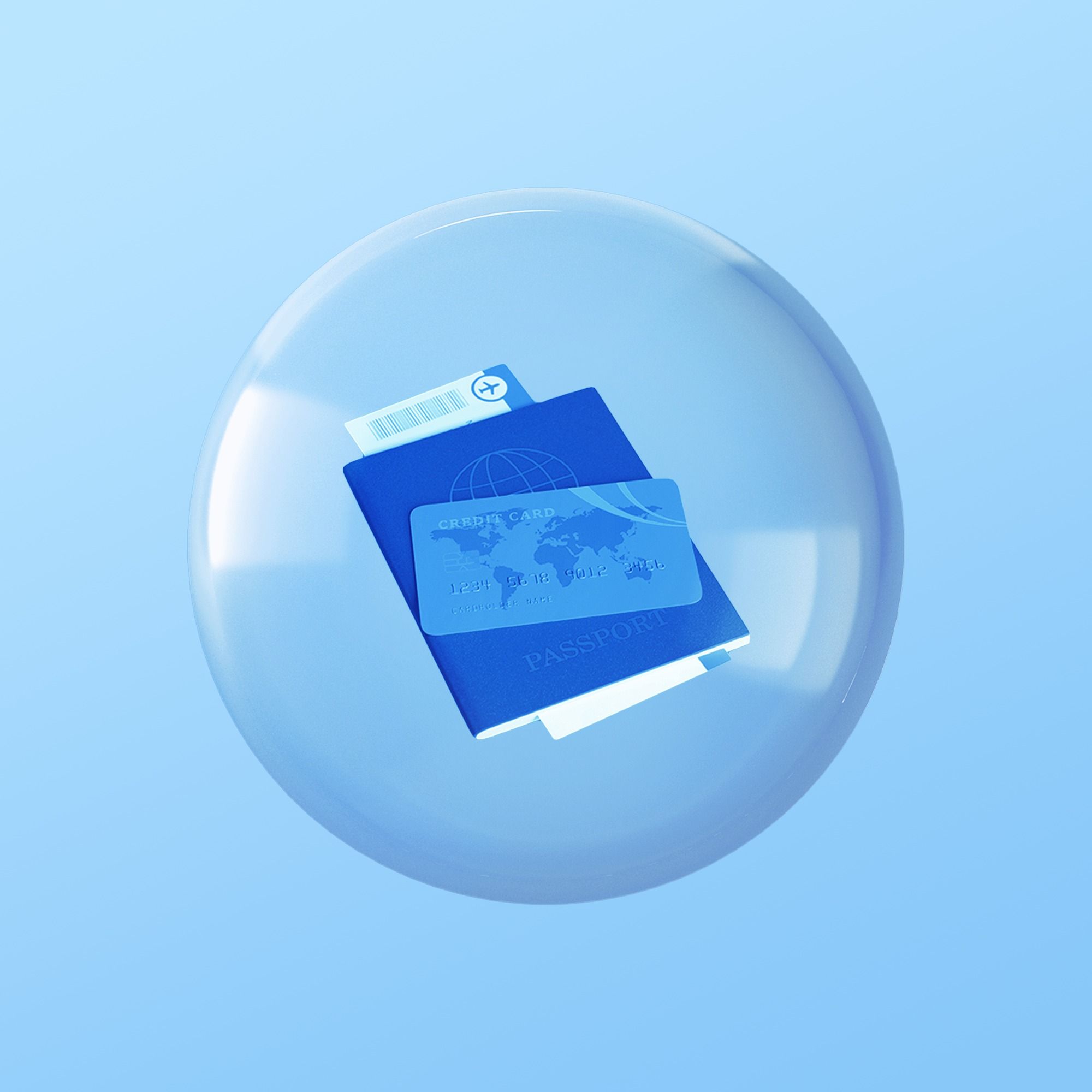How To Maximize Credit Card Points for Travel
Press play and read along
Transcript
Speaker 1 I'm Rosie Guerin, and you're listening to The Wirecutter Show.
Speaker 2
Hey there, it's Christine. This week on the show, we're talking about how to get the best deals on travel.
Seeing new places can be incredibly fun, mind-expanding, and fulfilling.
Speaker 2 It can also be really, really expensive. So we're talking about how to do it all for less.
Speaker 2 Earlier this week, we dropped an episode with Elaine Glusack, who writes the New York Times column, The Frugal Traveler, about her best tips for getting great deals on travel.
Speaker 2 To round out that conversation, we're going to drop a bonus episode today about some of the best ways to use credit card points to augment a travel budget.
Speaker 2
Wirecutter does not cover credit cards anymore, at least. We used to.
We do cover a variety of travel gear, and we have a ton of advice on how to shop for gear in a smart way.
Speaker 2 But when it comes to a travel budget, the flights and hotels are what really add up. And credit card rewards points can play a really big role in making travel more affordable.
Speaker 2 This kind of travel hacking, using credit card points for flights and hotels, can seem a little complicated and maybe even problematic if it lands you in debt.
Speaker 2 It's a financial decision with inherent risks.
Speaker 2 To help demystify this topic, we're inviting an expert on the show who knows a lot about it, Brian Kelly.
Speaker 2 You may know Kelly by the moniker he shares with the popular website he founded, The Points Guy.
Speaker 2 Kelly remains part owner of that business, though today the majority stake belongs to media company Red Ventures.
Speaker 2 Since it started in 2010, the Points Guy website has become an authority on how to access and leverage loyalty programs, credit card and airline miles, and of course, points for travel.
Speaker 2 Brian published a book back in February called How to Win at Travel with tons of tips and tricks on navigating the world of points.
Speaker 2 In a minute, Rosie is going to talk with Brian about how to use credit card rewards programs most effectively and the pitfalls to avoid.
Speaker 3 We'll be right back.
Speaker 4 As the holidays approach, get prepped for all your hosting and decorating needs with Wayfair.
Speaker 4 From dining tables and chairs that bring the whole family together to extra sheets and towels that make guests feel comfortable. Wayfair is your one-stop shop for everything home.
Speaker 4
This season, transform your space into an entertainer's dream. Get everything you need to host all in one place at Wayfair.
Plus, Wayfair ships everything fast and easy right to your door.
Speaker 4
Shop all things home today at Wayfair.com. That's at W-A-Y-F-A-I-R.com.
Wayfair, every style, every home.
Speaker 5
As a small business owner, you don't have the luxury of clocking out early. Your business is on your mind 24-7.
So when you're hiring, you need a partner that works just as hard as you do.
Speaker 5 That hiring partner is LinkedIn Jobs. When you clock out, LinkedIn clocks in.
Speaker 5 LinkedIn makes it easy to post your job for free, share it with your network, and get qualified candidates that you can manage, all in one place. Post your job.
Speaker 5 LinkedIn's new feature can help you write job descriptions and then quickly get your job in front of the right people with deep candidate insights. Either post your job for free or pay to promote.
Speaker 5 Promoted jobs get three times more qualified applicants. At the end of the day, the most important thing to your small business is the quality of candidates.
Speaker 5
And with LinkedIn, you can feel confident that you're getting the best. Find out why more than 2.5 million small businesses use LinkedIn for hiring today.
Find your next great hire on LinkedIn.
Speaker 5
Post your job for free at linkedin.com/slash wirecutter. That's linkedin.com/slash wirecutter to post your job for free.
Terms and conditions apply.
Speaker 1 Before we get back into the episode, I want to ask you for a quick favorite. You've heard us say this before, but the holiday season is sort of wirecutter Super Bowl.
Speaker 1 The team goes hard to help you figure out the best ways to host, cook, gift, and more.
Speaker 3 We love it.
Speaker 1 And we love hearing from you, our listeners. This year, we're planning an extra special gift-giving mini-series, and I want to know what you need help with when it comes to gifting.
Speaker 1 Is there someone in your life that's really hard to please? Are you wondering what the youths are looking for this holiday season?
Speaker 3 You and me both.
Speaker 1 Are you struggling with gift-giving etiquette? Are you wanting to gift with the constraints of a budget? We want to hear from you.
Speaker 1 So record a voice memo on your phone and tell us your first name, where you're calling from, and what your gifting question is. If it's about someone in particular, give us as much detail as you can.
Speaker 1 That'll really help us. Then email it to us at thewirecuttershow at wirecutter.com.
Speaker 1 Again, you can send your voice memo to thewirecuttershow at wirecutter.com and your question may wind up getting answered on the show. Thank you so much.
Speaker 3 Welcome back, Brian.
Speaker 1 Welcome to the show. So happy to have you here.
Speaker 3 Thanks for having me.
Speaker 1 So we're going to focus this episode on a discussion of basics for maximizing points for travel and how to do that with everyday purchases.
Speaker 1 Before we get into that, that, many listeners are probably familiar with the name of the site, but maybe not the person behind the Oz behind the curtain.
Speaker 3 So, talk to me about your origin.
Speaker 1 And I remember hearing that it had something to do with a family trip to the Caribbean, but give me the, give me, give me the story.
Speaker 3 So, there is a point sky.
Speaker 3 Yes, it's me.
Speaker 3
So, I started the point sky 15 years ago, but my real points origin story was in 1995. I was always the computer whiz in my house.
I was the AOL hacker.
Speaker 3
I had Prodigy Internet, you know, dial-up early 90s. And my dad had gotten a job for a startup.
And so he started working from home as an executive and he had to book his own travel.
Speaker 3
So my first job really was booking his travel on Travelocity. I was a little travel agent.
I was just obsessed with the internet.
Speaker 3 And one day he said he had all these frequent flyer miles, but they were split up between US Air and American. So he's like, we can't all go somewhere because it's two different programs.
Speaker 3
And I was 12 years old and I said, give me a beat. And I called the airlines.
And here's a tip, everyone. This still works in 2025 is be nice to phone agents.
The phone agents have a lot of power.
Speaker 3
I figured out a way. And I'm one of four kids.
So my parents, we grew up very, my parents are humble. They were not jet setters, you know, but I always had.
an urge to travel the world.
Speaker 3
So I was able to use all of our points. In 1996, we went to Grand Cayman and we took this trip for peanuts.
And then that became a yearly thing in the 90s.
Speaker 3 So my dad and I were doing the points game because it's a game and it's still a game to this day. The game has changed fundamentally, but the game can still be won for sure.
Speaker 1 It's amazing they were open to letting you fly.
Speaker 3
At age 12, metaphorically. Yeah.
Yeah. At age 12, we laugh.
We're like, what? But I would say to any parent out there, give your kids ownership of trips. I think it teaches so many skills.
Speaker 3 Planning, researching on the internet, understanding fake reviews, real reviews, and getting their input.
Speaker 3 And I think kids get a lot more bought into a trip when they get to plan some of the itinerary. So I highly recommend that.
Speaker 3 Maybe not the whole trip like I did, but I think it's good for kids to do that.
Speaker 1 Back to points.
Speaker 1 I think most people know that points are something that they can earn from using credit cards, whether it's a card from a bank, whether it's a co-branded card between an airline and a bank.
Speaker 1 How does it work? Why do credit cards offer points? What's in it for them? How is it not a scam?
Speaker 3
So here's the skinny on how credit card companies make money. And trust me, they're making a lot of it.
So never feel bad about getting your portion back. Why do credit cards offer points?
Speaker 3 The big reason why is in the U.S., interchange.
Speaker 3 So every time you use a credit card, grocery, restaurant, that vendor is paying about 2% in fees to the credit card processor, which then gets, most of it gets passed on to the bank.
Speaker 3 The bank then kicks you back a portion of that, about 1% or so in the form of rewards. The banks know that people are motivated by points, and there's a huge arms race that we are in the thick of.
Speaker 3 Amex versus Chase versus City versus Capital One. Because there's so much competition, they all have to compete to give you more value back.
Speaker 3 Now, they may lose money on the transaction, but they want you as a customer and spending every day because they're earning on all of your purchases. Plus, they're getting annual fees.
Speaker 3
And plus, inevitably, a lot of people are going to carry a balance at one point or another. Right.
So they're making a lot of money. You can get your value back, avoid interest, avoid late fees.
Speaker 3
You can win by getting your value of the points. And then, most importantly, once you have those points, redeem them for absolute maximum value.
The other biggest factor is your credit is an asset.
Speaker 3 And by getting credit cards, and let me be ultra clear here, you have to spend wisely and pay them off in full.
Speaker 3 If you are going to get into credit card debt, if you're carrying balances, do not get travel rewards credit cards. The APRs will eat you alive.
Speaker 3 What you're paying in interest will negate all the value of those points and more.
Speaker 3 So if you're in a situation where you're in debt, paying high APR, my recommendations today are not geared towards you.
Speaker 1 And just can you explain really quickly what APR is?
Speaker 3
Yeah, annual percentage rate is the percent you're going to pay for borrowing money from a bank. And on credit cards, it's really high.
It may be over 30%.
Speaker 3 Now, when we're talking about points and miles that you're getting, these are worth one to two cents apiece.
Speaker 3 So, really, there is no way where you pay interest on balances and that the value of your points are going to make sense.
Speaker 3 And if you are carrying a balance, no shame, but get a credit card that has 0% APR for 18 months.
Speaker 3 Neutralize that debt before you can truly take full advantage of the points ecosystem with credit cards.
Speaker 1 Are there other pitfalls that you warn people about to keep their eyes open for before they get in the game?
Speaker 3
I would say start slowly. So, another thing to consider is the sign-up bonus.
This is the initial dopamine hit that the credit card companies want you to get. It jumpstarts your balance.
Speaker 3
What they'll say is: if you're eligible, the bank's going to give you a bunch of miles or points as a welcome offer. And there's usually a spend requirement attached.
So $3,000 within three months.
Speaker 3 But there's some nuance that some people make mistakes on, including the annual fee for the card does not count towards the spend. Right.
Speaker 3
And also the clock starts ticking not when you activate the card. This is a big one.
It's when you get approved.
Speaker 3 So if you get approved and you're on vacation, you come back two weeks later, so many people will think, oh, it's, you know, when I start spending on it, wrong.
Speaker 3 So I always recommend you overspend beyond what you think you've hit just to be safe, but understand there are small nuances. There's always a cost.
Speaker 3 So I always recommend everyone who gets into this start with one card, pay it off, get in the groove. But these sign-up bonuses are real money.
Speaker 3 And this is what gets people really hooked into this game.
Speaker 1 So you have to, when thinking about a sign-on bonus, you have to think about offsetting the cost, the annual fee of the card, number one.
Speaker 1 And number two, think about you might get instantly approved for a card.
Speaker 3 Yep.
Speaker 1 Try and start spending toward that minimum spend as soon as possible and not waiting until you open the mail.
Speaker 3 And many credit card companies will give you a digital card so you can begin using it right away.
Speaker 1 You, I know in your book, talk about points as an illiquid asset. So that means
Speaker 1 that points are part of your personal finance package. When you look at your personal finances, you should consider it as currency.
Speaker 3
Absolutely. And when you're thinking about rewards, there are three flavors.
In my opinion, the main three points currencies, rewards, currencies are number one, cash back. So that's pretty simple.
Speaker 3
It's a percentage back of every dollar you spend. In general, I would say the average is about 1.5% cash back.
That's a solid return.
Speaker 1 And who is that good for?
Speaker 3 I would say this is good for people who have no interest in traveling, who who might have really tight budgets, are really just focused on their finances, putting money away into an emergency fund.
Speaker 3
Like that's what you should at least be getting cash back. That is the baseline.
So the second type of currency is co-brand rewards. And this is your airline credit card, your hotel credit card.
Speaker 3 Whenever you spend, you're getting points directly deposited into a single airline or hotel.
Speaker 3 The upside to this is that you can get a lot of perks, free check bags, priority boarding, suite upgrades, et cetera.
Speaker 3 So you're only only earning one specific airline currency, but you're getting some other perks that might have real value, that might make your travel smoother, that might save you a lot of money.
Speaker 3 You know, having a hotel credit card that gets your family breakfast.
Speaker 1 And is this good for people who are brand loyal?
Speaker 3 You need to do the math. So if you check bags and fly Delta all the time, you know, having one of their co-brand cards gets you a free check bag for you and I think eight companions.
Speaker 3 So the check bags these days can easily be 40 bucks each. So think about it, one round trip, you're paying $150 for a card, but you're you're saving $400 a trip, right?
Speaker 3
So that's where you have to do the math. Because the third currency and the one that I'm the most bullish on, transferable points from credit card companies.
And this has been the biggest trend.
Speaker 3 So instead of earning a single airline mile or a cash back point, you earn with the bank. And then the bank gives you a couple of really great ways to redeem those points.
Speaker 3 Number one, they allow you to use it like cash to book any flight or hotel, usually at about one cent or one and a half cents. But the real
Speaker 3 special sauce in the transferable points is transferring them to different airlines and hotels. So a lot of the cards, often they run transfer bonuses.
Speaker 3 So this allows you, instead of just banking in one single airline program like a co-brand card does, you can bank into a mega program that allows you to transfer to tons of different options.
Speaker 3 Most points experts will say put most of your spend on a transferable point card or a couple of them because it opens up a world of opportunities.
Speaker 1 So you can earn rewards from groceries, dining out. You can even earn rewards by paying your utilities.
Speaker 1 What is your practical advice, Brian, in terms of maximizing those rewards?
Speaker 3 I want everyone to take out their monthly budget, look at the major categories, the dining, rent,
Speaker 3 groceries, gas. You know, how much you spend? What are your top categories and where are you spending the most money?
Speaker 3 Yes, you may want to just go out and just start applying like crazy, but no, have a strategy. Do some research on each bank's rules for which cards to get.
Speaker 3 And then really the biggest thing is look at what you spend money on and finding the credit card that has the highest multiplier in that category. Okay, so what is the best credit card for dining?
Speaker 3 So there's a lot of them out there because dining is a popular category. And, you know, then the other thing is the annual fees on these cards.
Speaker 3 So A lot of the cards that have higher annual fees have higher category bonuses, but you have to take into account, okay, I'm spending more to get that.
Speaker 3 So it's really a holistic vision of looking at not just the earning of points. So how many of these points do I earn? How can I use them? And then how much is this costing me?
Speaker 1 So what I'm hearing is in every aspect of playing the points game, the most important thing,
Speaker 1 it seems to me, is understanding what your personal finances are, what your goals are, not just goals for travel, but your financial goals and how you actually spend your money.
Speaker 1 So therefore, you can figure out how to leverage different cards based on what your actual reality is.
Speaker 3 Correct.
Speaker 1 So when you have a card like an Amex or a Chase where you have rewards, you have a bank of them. Are you sitting down and assessing when you're planning for a trip? Let me think about where
Speaker 1
I want to go. Let me think about what airline I want to fly and then transfer the points from that bank to whatever airline or hotel you're trying to use.
What is the joy?
Speaker 3 The joy of the transferable points programs is that you can bank with confidence knowing, well, I don't know if next summer I want to go to Italy or I want to go on Safari or what if we,
Speaker 3 because no matter where you want to go, you generally have so many options that you can make it work.
Speaker 3 And one of my best tips these days is accrue valuable points, these transferable points, and let the deals tell you where you go on vacation.
Speaker 3 You know, you may have bucket list trips or you want to go to Italy, and I know a lot of people want to do Florida over the holidays, but airline programs change so much.
Speaker 3 I generally just don't want you to put all your miles in one single airline because they devalue year over year.
Speaker 3 Meaning that what once was a 90,000-point free night at your favorite resort overnight jumped to 130,000 points a night.
Speaker 3 If you put all your points in a credit card company, even if one of their transfer partners or a couple changed the rules, you then have other options.
Speaker 1 When is it worth buying points?
Speaker 3 So buying points is really interesting. It's definitely an arbitrage game, and you need to know how to redeem them.
Speaker 3
So if you don't have an exact redemption in mind or know how you're going to redeem those points, don't buy them. Buying points is only for people if you've done the math and you know.
the redemption.
Speaker 3
Give an example. Yeah.
So Hilton, Hilton allows you to buy points pretty cheap. And Hilton has this this new, beautiful Waldorf Astoria in Costa Rica that just opened.
It's about $2,000 a night. Wow.
Speaker 3 But it's about 120,000 points a night. So what that means is you can buy 120,000 points at a half a cent a piece for $600.
Speaker 3
So you can spend $2,000 to book direct or you can buy $600 to get a free night via points. Okay.
And Hilton gives the fifth night free when redeeming for points, not when paying.
Speaker 3 So this is where a lot of smart people I know say, why would I ever pay directly when I can buy points for a third of the price and then get the fifth night free? Bam, that's when you just won.
Speaker 3
Air France, the same flying blue is an amazing program. 60,000 points one-way business class, New York to Paris.
That's a $3,000 ticket.
Speaker 3
Air France will let you buy points at around one and a half cents a piece. So, 60,000 points is 900 bucks.
So, would you rather pay 3,000 to the airline or would you rather buy points and spend 900?
Speaker 3 Right.
Speaker 1 And of course, Hilton and the Flying Blue program, these are just examples of the types of strategies you can employ when you're looking to buy points and then use those points to buy reward flights or hotel nights and ultimately pay less.
Speaker 3 Not only that, what I want people to understand is the benefit to buying points, especially when there's buy miles promotions, is
Speaker 3 most award tickets, most hotel reservations are fully refundable when you use your points.
Speaker 3 Award tickets are when you transfer points to an airline's frequent flyer program and you book the flight as an award ticket completely using miles. That is refundable.
Speaker 3 This is something most people don't realize. When you're calculating, well, should I redeem miles or should I pay for the ticket? When you redeem miles, it is a refundable ticket.
Speaker 3 So don't compare it to what basic economy costs because when you redeem your airline miles for an award ticket, that's a full fare ticket, meaning up until one minute before departure, you can cancel, get all your miles back for free.
Speaker 1 That is incredible. I had no idea.
Speaker 3
Yes. And I take this a step further.
Having points is like an insurance policy. Because guess what? When airlines start delaying and canceling my flight, I'm not waiting in the two-hour line.
Speaker 3 I'm on my phone instantly booking backup reservations on different airlines. So if my one airline can't get me out, I'm walking to the other airline because I have a ward ticket for two hours later.
Speaker 3
If my original flight ends up going out, I click one button to get all my miles back for the other reservations. You know, these points are very valuable.
That's a hack.
Speaker 3
And one other tip, airlines charge a lot for frequent flyer mile tickets. You may want to just get something booked.
Your honeymoon, you're not going to risk waiting till last minute.
Speaker 3
But you pay a premium. Keep checking.
And if the price goes down, most programs will let you cancel and rebook at the lower rate and get your miles back.
Speaker 3 And with the airlines bullying us around, I want people to have this information where they can, you know,
Speaker 3 fight back and get their money off the table.
Speaker 1 Brian Kelly is the founder of The Points Guy and author of the book, How to Win at Travel. Brian, thank you so much for joining us.
Speaker 3 Thanks for having me, Safe Travels.
Speaker 1
That's it for us till next week. If you like the show, we'd love you to subscribe wherever you listen to podcasts.
Thank you so much for listening. We really appreciate it.
Speaker 3 Peace.
Speaker 4 As the holidays approach, get prepped for all your hosting and decorating needs with Wayfair, From dining tables and chairs that bring the whole family together to extra sheets and towels that make guests feel comfortable.
Speaker 4
Wayfair is your one-stop shop for everything home. This season, transform your space into an entertainer's dream.
Get everything you need to host all in one place at Wayfair.
Speaker 4
Plus, Wayfair ships everything fast and easy right to your door. Shop all things home today at Wayfair.com.
That's w-a-y-f-a-i-r.com. Wayfair, every style, every home.





